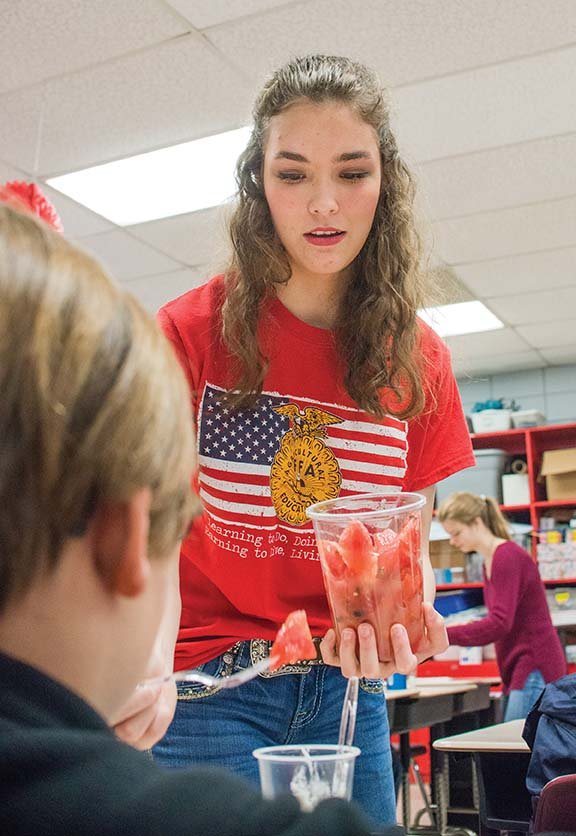Two Glen Rose High School seniors and friends are helping their fellow younger Beavers learn about agriculture and its importance in the food chain.
As part of their Advanced Placement literature class, Amy Hendricks and Grace Baker are required to conduct a service project. They have been increasing fourth-graders’ agriculture literacy every other week through a special teaching project.
Hendricks noted that some agricultural issues are important to her, such as the use of GMOs to meet a growing population’s food needs, and why it’s important to teach children about agriculture.
“Agriculture is a big part of their lives, whether they realize it or not,” Hendricks said. “Agriculture is also an area that needs a lot of attention and development. We need to figure out how to feed a growing population, which means more research needs to be done, and GMO consumption needs to be less stigmatized.
“These are issues that are very important and will only become more important as time goes on, which means the younger generation needs to be well informed about them. We hope to give them a solid foundation in agricultural literacy.”
Baker is president of the local FFA club, although the project is independent of FFA, Hendrix said.
“Grace is very passionate about agriculture and wanted to do this project,” she said.
Baker, who plans to pursue an agriculture-education career after college, shared that by the year 2050, 9 billion people will need to be fed.
“That means we have to boost our agricultural production by 100 percent before then,” she said.
Baker pointed out that in Saline County, there aren’t agricultural programs in the schools, which prompted her to teach the younger students.
“I enjoy teaching the kids about agriculture because kids today aren’t taught about where their clothes and food come from. They believe that it all just magically appears in Walmart or Kroger, and I want to help stop that belief,” Baker said. “Hopefully, by the end of the year, the kids in the class will have an understanding on how agriculture helps them live on a day-to-day basis. It is very sad to me that people don’t understand the importance of agriculture, and I hope that the kids will soon.”
Both girls have a short history with agriculture and gardening. Hendricks said she grows a garden every year with her mother and is constantly influenced by Baker’s passion.
Baker said she realized the importance of agriculture on her first day in agriculture class in the eighth grade.
“After that, I got very active in the FFA program, and my love for agriculture runs deeply and passionately,” she said. “Almost everyone at school knows it and even calls me ‘the FFA girl.’ I became treasurer of my chapter in ninth grade and started receiving awards since.”
The girls’ lesson plan begins with which crops are grown in Arkansas and around the nation, Hendricks said.
“We’ve talked about seed germination, photosynthesis and how climate affects plant growth,” she said. “We started to grow a pineapple with them in the class, and we will later grow some lettuce, peas and tomatoes with them in the greenhouse. At the same time, we’re teaching the kids why agriculture is important to them and their lives.”
Their classes began at the beginning of the school year last fall and will go through April, Baker said.
“We hope the class following us will take the project that we have started and make it better and make it their own,” Baker said. “We also hope the next class of fourth-graders can get a good knowledge about agriculture.”
After high school, Hendricks said, she plans to attend college with aspirations of becoming a doctor.
Baker said she plans to attend Southern Arkansas University and major in agriculture education.
“With that degree, I would like to either work for Heifer International or the Farm
Bureau,” Baker said. “There are endless possibilities for me. My biggest dream is to become a GMO technician, but a girl can only dream.”
